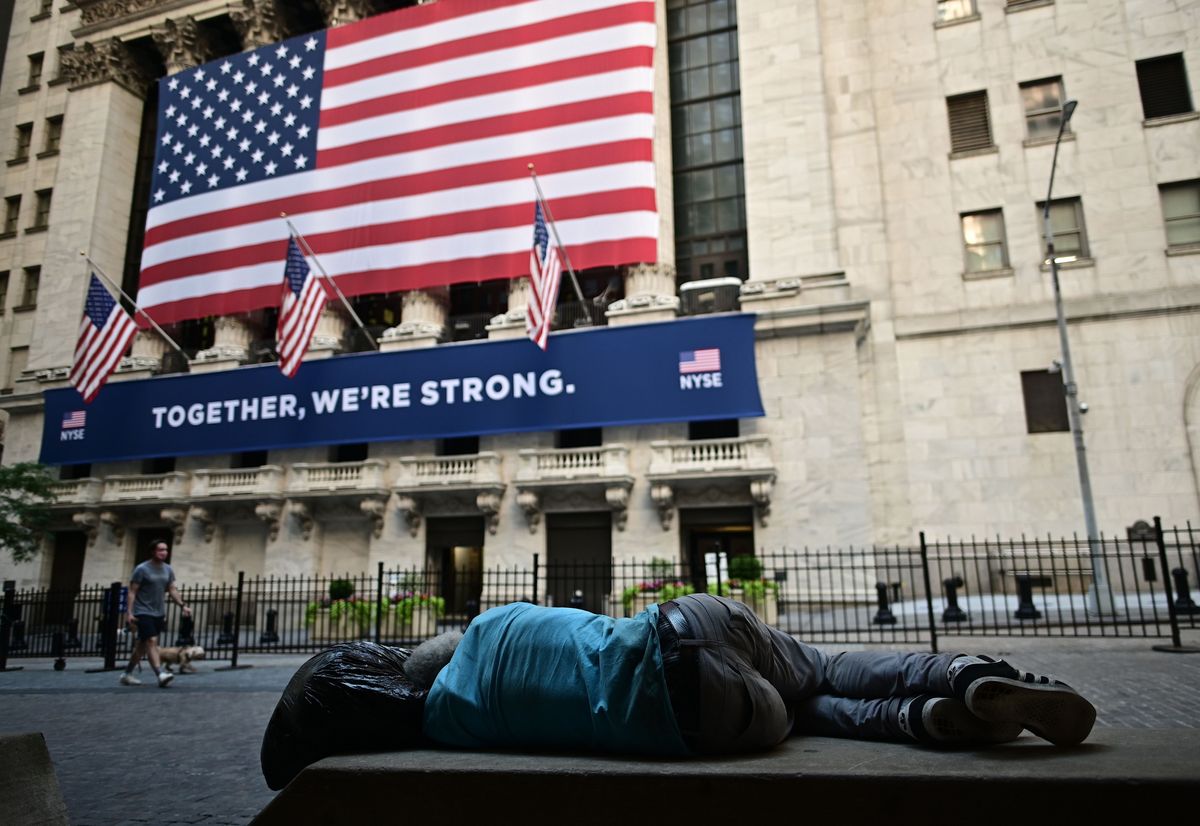The stock market is recovering from COVID-19, but is America?

A few minutes every morning is all you need.
Stay up to date on the world's Headlines and Human Stories. It's fun, it's factual, it's fluff-free.
The end of August saw some positive news for the American financial markets, leading some to claim that the United States might finally be on the road to recovery from the coronavirus pandemic and its subsequent economic fallout.
The Standard & Poor 500-stock index finished out its best August since 1986, setting record highs in trading on the last six days of the month.
But while the financial markets have generally performed well in recent weeks, weekly unemployment claims in the US remain high and pessimism about the future of the economy in general is widespread among the public.
As such, the success of the big three financial markets may be misleading as to the general health of the American economy. They may even showcase a different reality altogether.
Wall Street recovery
Despite the economic onslaught wrought by the coronavirus pandemic in the US, the big three financial markets have enjoyed a positive last few weeks.
The S&P 500, Dow Jones and Nasdaq have all witnessed strong monthly returns for August, helping to erase their losses for the year.
Investors remain confident of a V-shaped recovery for the economy as a whole, with President Donald Trump alleging that a coronavirus vaccine – the key to restoring the economy to normalcy – will be available come November.
Government initiatives have also helped investors. The Federal Reserve has cut interest rates during the crisis, maintained access to credit and allowed investors to take out loans for investments.
Some have also claimed that the markets’ recovery is a window into the future of the US economy. Jurrien Timmer, director of global macro at Fidelity Investments, told CNBC that the stock market starts declining before the wider economy does, but will also “start recovering about four months before the end of a recession.”
By this logic, the stock markets act as a so-called “leading indicator” of the wider economy, helping to both forecast when an economic downturn is arriving or when a recovery is on the cards.
It is for this reason, the growing health of the financial markets, that tech startups, less impacted by the coronavirus economic fallout than other sectors, have been aggressively seeking to go public via an IPO in recent months. Palantir, Airbnb and Unity are among those seeking to take advantage of the seemingly strong financial market.
Reality check
The positive news coming out of Wall Street may hide the true pain that the US economy and many workers and ordinary people are facing as a result of coronavirus-induced difficulties.
The Bloomberg recovery tracker shows that while the financial markets are experiencing positive news and growth, jobless claims, consumer confidence and even the number of COVID-19 cases are all displaying negative signs that do not match the market positivity.
Furthermore, aside from stimulus payments back in late-March, little effort has been taken to address the claims by some economists that a deeper coronavirus recession awaits millions of ordinary Americans in the near future.
No further stimulus package has been agreed upon by politicians in the US, even as other countries have pledged billions of dollars more – on top of their original economic stimulus plans – to continue fueling recovery efforts against the COVID-19 fallout.
This inaction comes as weekly jobless claims in the US hover around the one million mark, with companies across a variety of industries in the country forecasting that hundreds of thousands of redundancies will be made from their workforces.
These include 28,000 planned redundancies at MGM Resorts, 19,000 (about 20% of its workforce) from American Airlines and 21,000 from oil services company Schlumberger. These figures typically include workers previously furloughed, with government assistance.
For many Americans, an expected “avalanche” of evictions is likely to force homelessness on those who have been made redundant in a time of unprecedented economic turmoil or have seen bans on evictions end as states take steps to reemerge from lockdown.
According to the Aspen Institute, some 30 million out of 110 million Americans who live in rental housing are at risk of eviction by the end of September, particularly as a result of the end of unemployment benefits and the end of eviction bans.
If these evictions were to occur without any further government aid being extended during this time of crisis, “long-term harm to renter families and individuals” would result leading to the “destabilization of communities across the United States.”
For many young Americans, the health of the stock market means little when the coronavirus economic fallout has already ensured they will bear scars for years as a result of having entered the workforce in the midst of a financial crisis.
William Gale of the Brookings Institution has claimed that young Americans will, just as in the aftermath of the 2008 financial crisis, have to deal with the effects of the COVID-19 crash for years into their future careers, including the “scars” of later retirement, lower wages and less chance at homeownership.
It is unsurprising, then, that nearly 70% of Americans describe the current economic situation the country faces as “bad,” according to a Pew Research global survey.
This figure shoots up to nearly 82% of Americans aged 18 to 29 who believe the economy is in poor shape.
Increasingly, it appears that the success enjoyed by Wall Street appears less tethered to the reality faced by millions of Americans. All they have to look forward to is joblessness, evictions and an uncertain financial future.
Have a tip or story? Get in touch with our reporters at tips@themilsource.com




Comments ()